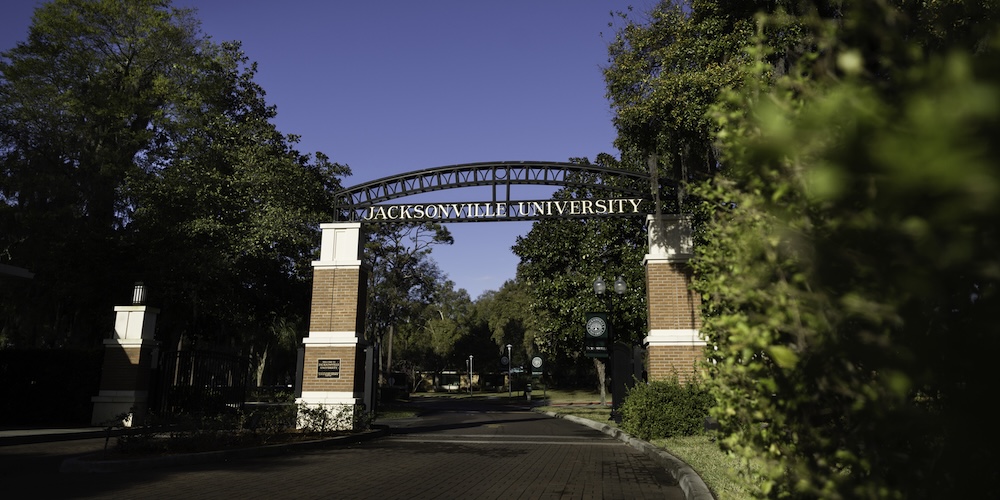The ribbon-cutting ceremony for the College of Law represented much more than the official opening of the classroom, library, office and study spaces that are housed on the 18th floor of the VyStar Tower in Downtown Jacksonville.
The event – and the launch of the Jacksonville University College of Law – was decades in the making. Jacksonville University’s newest college advances the University’s mission, focusing on small classes, continuous practical professional training, and engaged scholarship.
It all started in the 1930s with the original charter for the University, then known as William J. Porter University, which “envisioned the study of the principles and practices of law” at the school.
Nearly 100 years later, that became a reality as the inaugural 14 students started classes in August. Plans were set in place for the College of Law a decade ago, said Provost and Senior Vice President of Academic Affairs Christine Sapienza, as President Tim Cost took the helm at the University.
“When I think about 10 years ago and where Jacksonville University was positioning itself under the leadership of president Tim Cost, we were positioning ourselves to be very strategic and become something comprehensive – and to build,” Dr. Sapienza said. “Jacksonville University positioned itself not just a year ago, but decades ago, to be where we are today. To be a highly ranked, regional, premiere private university.”
Dean of the College of Law, Nick Allard, credited the support of the community, particularly
the legal community, Mayor Lenny Curry and the City Council in helping get the College
of Law off the ground. Those present at the ceremony included State Attorney Melissa
Nelson, Public Defender Charlie Cofer, City Council President Terrance Freeman, Gunster
shareholder Mike Freed ’90, Chief Judge Tim Corrigan, and more.
“We are overwhelmed by the positive outreach of the bench and the bar,” Allard said.
The opening of the College of Law also means a new source of legal talent in the city, something that is desperately needed, said Jacksonville Mayor Lenny Curry, who spoke at the event. The College of Law was initially founded with private investment and $5 million in public investment from the City of Jacksonville.
“It's been over 20 years since we've had a pipeline of this talent and the community has been missing that locally,” Curry said. “So this is an historic day, this was a no-brainer for this to happen. I am incredibly proud and excited about it.”
While it has just been a few weeks in classes, Allard said it was already evident that the inaugural class is special.
“They are highly intelligent, mature, confident and have this intangible quality of curiosity, so we’re off to a really good start,” he said. “They want to be part of an institution that succeeds. They like that the law school is new, it's not just a cookie cutter operation.”
“Anything but success is not an option,” Allard said.
The Jacksonville University College of Law is accepting applications for the spring semester starting in January 2023, and for the fall semester beginning August 2023. For more information on the application process, visit ju.edu/law.
About the Jacksonville University College of Law
Founded in 2022, the Jacksonville University College of Law is committed to providing quality legal education, focused on experiential learning and community partnerships, especially in the service of Jacksonville, Florida, and beyond. The College offers small class sizes designed for individualized attention, externships at prestigious organizations, access to the City of Jacksonville’s greatest legal resources, and strong community connections. Consistent with accreditation protocol dictated by the American Bar Association (ABA), the Jacksonville University College of Law will begin the accreditation process in the spring of 2023. Our goal and highest priority is to achieve provisional accreditation by the time our first class of students graduates. The College of Law is not currently approved by the Council of the Section of Legal Education and Admissions to the Bar of the ABA and makes no representation to any applicant that it will receive approval from the Council before the graduation of any matriculating student.





